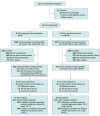Nurse-Led Family Support Intervention for Families of Critically Ill Patients: The FICUS Cluster Randomized Clinical Trial
- PMID: 40720110
- PMCID: PMC12558129
- DOI: 10.1001/jamainternmed.2025.3406
Nurse-Led Family Support Intervention for Families of Critically Ill Patients: The FICUS Cluster Randomized Clinical Trial
Abstract
Importance: Among families of patients treated in intensive care units (ICUs), insufficient communication and support may increase family distress that can lead to adverse health outcomes. Family-focused care is recommended, but high-quality experimental research is lacking.
Objective: To determine whether a nurse-led, interprofessional, multicomponent family support intervention improves family satisfaction, communication quality, and support to families.
Design, setting, and participants: This study was a multicenter, cluster-randomized clinical trial with 1:1 allocation of ICUs using minimization. Family members of critically ill patients who were treated for at least 48 hours at 16 adult ICUs in 12 hospitals in Switzerland were enrolled between May 2022 and January 2024. The first follow-up after patient ICU discharge was completed in February 2024. Data of all participants were analyzed using linear mixed-effects models, with the individual as the unit of inference.
Intervention: Intervention ICUs implemented a novel family nurse role that engaged and liaised with families, offered relationship-focused, psychoeducational support, and ensured interprofessional communication along the ICU trajectory. Control ICUs continued with usual care.
Main outcomes and measures: The primary outcome was the family satisfaction with ICU care through the Family Satisfaction with ICU survey (range, 0-100), assessed after patient ICU discharge. Secondary outcomes included the quality of family-clinician communication, measured by the Questionnaire on Quality of Physician-Patient Interaction (range, 1-5), and cognitive and emotional support, assessed by the Family Perceived Support Questionnaire (range, 14-70).
Results: Of 2057 consecutively invited family members, 412 were enrolled in the intervention and 473 in the control arm (median age, 54 [IQR, 42-65] years; 429 partners [48%]; and 568 women [64%]). The intervention improved overall family satisfaction with ICU care by a mean difference (MD) between groups of 2.39 (95% CI, 0.31-4.47; P = .02). Sensitivity analyses adjusting for cluster- and individual-level characteristics in combination with multiple imputation confirmed this result. Satisfaction with involvement in decision-making was more strongly increased than satisfaction with care. Furthermore, the intervention improved communication (MD, 0.37; 95% CI; 0.16-0.58; P = .002), and cognitive and emotional support (MD, 8.71; 95% CI, 4.71-12.71, P < .001).
Conclusions and relevance: This randomized clinical trial found that a nurse-led, interprofessional family support intervention in ICU had a small, statistically significant, but clinically uncertain benefit on family satisfaction, and relevantly improved quality of communication and cognitive/emotional support of family.
Trial registration: ClinicalTrials.gov Identifier: NCT05280691.
Conflict of interest statement
Figures
Comment on
-
Supporting Families in the Adult Intensive Care Unit With High Touch-Low Tech Interventions.JAMA Intern Med. 2025 Sep 1;185(9):1150. doi: 10.1001/jamainternmed.2025.3382. JAMA Intern Med. 2025. PMID: 40720112 No abstract available.


